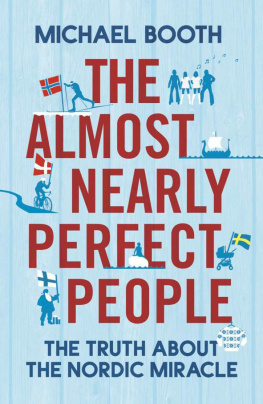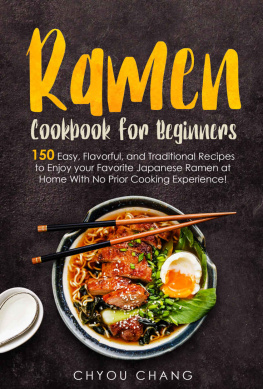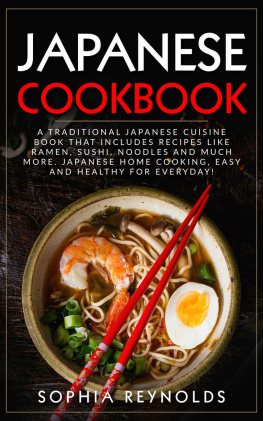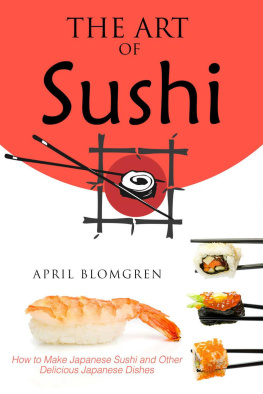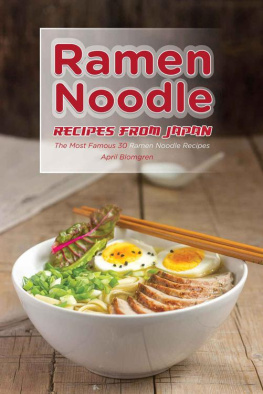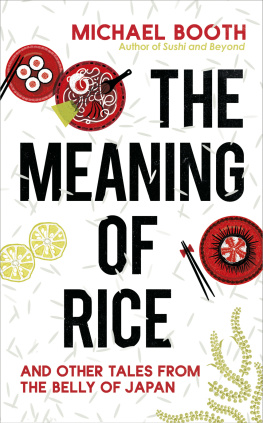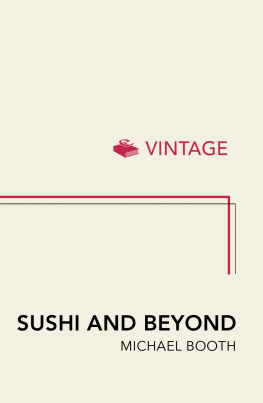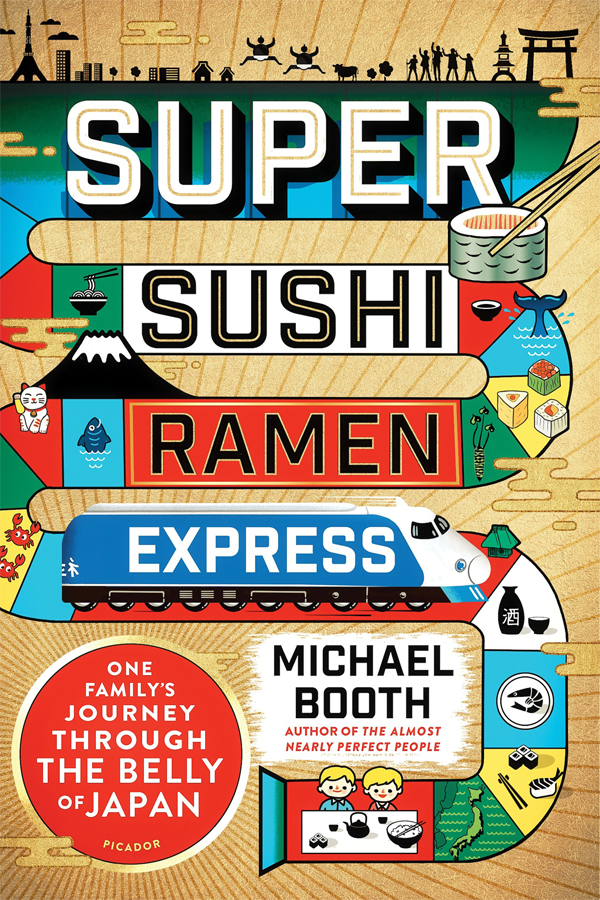Contents
Guide

The author and publisher have provided this e-book to you for your personal use only. You may not make this e-book publicly available in any way. Copyright infringement is against the law. If you believe the copy of this e-book you are reading infringes on the authors copyright, please notify the publisher at: us.macmillanusa.com/piracy.
To Asger and Emil


It had started off as a perfectly temperate discussion about the relative merits of French and Japanese cuisines. I had recently had dinner at the feted French restaurant SaQuaNa, in Honfleur, on the Normandy coast. The chef, Alexandre Bourdas, was a fast-rising culinary star in France, and I had innocently remarked on his lightness of touch and the freshness of his raw ingredients, drawing what turned out to be a rash comparison between his food and Japanese cooking. I knew that Bourdas had worked in Japan for three years, so it didnt seem too outlandish to suggest that his cooking had been influenced by the food he had eaten there.
I ought to have known this would be a red flag to my friend Katsotoshi Kondo.
* * *
What do you know about Japan food, huh? Toshi snapped. Do you think you know anything about Japanese food? Only in Japan! You cannot taste it here in Europe. This mans cuisine is nothing like Japanese food. Where is the tradition? Where are the seasons? Where is the meaning? Tu connais rien de la cuisine Japonaise. Pas du tout! From experience, I knew that this sudden switching of languages on Toshis part was a bad sign. He was also pouting now. I had to get my retaliation in before he detonated fully.
I know enough about it to know how dull it is, I said. Japanese food is all about appearance. Wheres the comfort, the warmth, the hospitality? No fat, no flavor. What have you got? Raw fish, noodles, deep-fried vegetablesand you stole all that from Thailand, the Chinese, the Portuguese. Doesnt matter, though, does it? You just dunk it in soy sauce, and it all tastes the same, right? All you need to make good Japanese food is a sharp knife and a good fishmonger. What else is there? Ooh, dont tell me, cod sperm and whale meat. Mmm, got to get me some of those.
I had met Toshi while training at Le Cordon Bleu cooking school in Paris a couple of years earlier. A tall, rather severe-looking, half-Japanese, half-Korean man in his late twenties, he was an enigma wrapped in many layers of inscrutability, but he had a subversive, dry sense of humor lurking behind the gruff Beat Takeshi facade.
While the rest of us would wear our chefs whites for days until we looked like walking Jackson Pollocks, Toshi was always immaculately turned out. His plates were perfect: his food presented just so, with ample white space surrounding it; his knives were always fearsomely sharp. But he had clashed with the French chefs who taught us. They invariably marked him down because he refused to cook fish for more than a few seconds and served vegetables with bite rather than soft all the way through, as they preferred. This seeded in Toshi a lingering resentment toward the French and their cuisine, but still he stayed on in Paris, partly, I suspect, out of a sheer bloody-minded determination to single-handedly educate the locals in the superior ways of Japanese cooking.
After graduating, Toshi went to work in a Japanese restaurant in the sixth arrondissement, the kind of placevirtually invisible from the street but a haven of serenity withinthat registered on the radar only of Japanese tourists. We kept in touch and met up from time to time to eat and talk food, our get-togethers usually descending into a childish rally of insults.
But this time, things ended slightly differently. OK, just shut up, OK? Toshi said, his head disappearing beneath the table as he fished around in his satchel. I have something for you.
He handed me a large hardback with a blurry painting of a leaping fish on the cover. Momentarily taken aback, I promised to read it and thanked Toshi. This was embarrassing. He had never given me anything before. It had taken me some time to explain to him the concept of buying a round of drinks, for instance. It was clearly an expensive book, too, and, though it sounds ridiculous given the occasions he had ranted at me, for the first time, as I held the book on my lap on the bus home, I began to understand how keenly he must have felt the slights from me and from our teachers at Le Cordon Bleu.
The book was Japanese Cooking: A Simple Art , by Shizuo Tsuji, a new edition of the original, which was published in 1979. Introductions by Ruth Reichl, the former editor of Gourmet magazine, as well as the late M. F. K. Fisher, served notice that this was no ordinary food book. As I would later discover, it is still the preeminent English-language Japanese food reference source, the bible of Japanese cooking for a generation of Japanophile food lovers throughout the world.
This is much more than a cookbook, writes Reichl. It is a philosophical treatise.
There are recipes, of course, over two hundred of them, covering grilling, steaming, simmering, salads, deep-frying, sushi, noodles, and picklingmany of the dishes unfamiliar to mebut along the way Tsuji also covers everything from the spiritual meaning of rice to the role of tableware in Japanese cuisine. No Japanese, however humble, would think of serving food on just any old plate, relying on flavor alone to please, he writes. Tsuji emphasizes the fundamental importance of the seasons in Japanese food: in Japan, ingredients with a particularly brief seasonal window are often celebrated with quasi-spiritual verve by cooks and diners. I learned, too, that the Japanese employ a number of virtually flavorless ingredientstofu, burdock, and something called konnyaku , a dense, gelatinous, dark brown to hazy gray cake made by peeling, cooking, pounding, and coagulating a root called devils tonguepurely for their texture and mouthfeel. Others, such as steam-processed bonito fillets, dried to wood-like hardness and shaved into flakes (referenced in the title of the John Lennon album Shaved Fish , I now realized), or the fearful-sounding fermented soybean breakfast dish of natto , were, to me, mystifying. Indeed, there seemed to be a remarkable array of fermented foodstuffsfrom miso to soy to natto, not forgetting fermented sea slug entrailsall of which belied the impression I had of the Japanese as being fussy about rotten foods, like cheese and yogurt.
I knew that the Japanese were wary of applying heat to their food, but Tsuji writes breezily about a dish in which chicken is tinged with pink near the bone (in fact, it turns out that chicken sashimi raw chickenis not uncommon in Japan), and more generally of an overriding obsession with freshness and simplicity in cooking, which explained their aversion to excessive application of heat.
At times, I detected a note of condescension, albeit wrapped in a tissue of humility: Many of our foods may seem thin and lacking in substance, he writes in his preface. But you must learn to look for the subtle, natural aroma and flavor of ingredients. Occasionally, subsequent developments in global food trends had rendered his concern for the squeamish sensibilities of the Western palate a little outdated: The best-loved food in Japan, sashimisliced raw fishoften seems unbearably exotic, almost bordering on the barbaric, and requiring a great sense of gastronomic adventure and fortitude to down!


